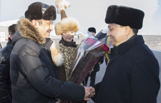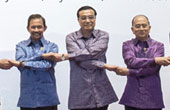Remember dark history for precaution on future
(Xinhua) Updated: 2014-12-13 09:18BEIJING - Those who remember history as it is deserve a better future. The sentence carries specific weight as China holds its first National Memorial Day for Nanjing Massacre Victims on Saturday.
Chinese President Xi Jinping will join survivors and relatives of victims of the 1937 Nanjing Massacre at a solemn ceremony to commemorate the over 300,000 people slaughtered by Japanese aggressor troops in that horrific page of history.
The event will be of particular significance as the country that carried out the carnage 77 years ago is attempting to whitewash its dark past and gloss over its war-time atrocities.
Alarming examples include visits by Japanese cabinet and Diet members to the notorious Yasukuni Shrine in Tokyo, which honors 14 convicted Class-A WWII war criminals among Japan's war dead, denials of the forcible recruitment of foreign sex slaves, and the push for the removal of a longstanding ban on so-called collective self-defense.
The latest case was the issuance by the Yomiuri Shimbun newspaper last month of an apology for the "inappropriate" use of the term "sex slave" in its past articles, which marks yet another flagrant attempt to keep the nation away from due historical responsibilities.
Peace-loving people are appalled to see certain Japanese politicians and media outlets are so unscrupulous that they never recognize the unspeakable heinous crimes committed by war-time Japan, let alone feel conscience-stricken and repentant.
What also has set the region's nerves on edge is Japan's rightward shift and the resulting assertiveness in its military posture and diplomatic exchanges with neighboring countries, which smacks of a plot to change the established post-war world order.
China's observance of a national memorial day is not aimed at stoking hostility but at remembering and drawing lessons from history and, on that basis, creating a peaceful future.
For their part, Japan's political elite should realize that catering to the right-wing elements for personal political gains will eventually backfire, possibly at the cost of peace and stability of East Asia as a whole.
With the issue of history having become an unavoidable hurdle in Japan's relations with neighbors, the best way for the island nation to proceed is sincere acknowledgement and repentance of its war-time past, rather than futile attempts to reject it.
- Archive documents refute Nanjing Massacre denial
- Documents reveal body disposal of Nanjing Massacre
- China to mark Nanjing Massacre with full honors
- China releases CPC papers' coverage of Nanjing Massacre
- First hand accounts expose brutality of Nanjing Massacre
- American professor publishes book on Nanjing Massacre










